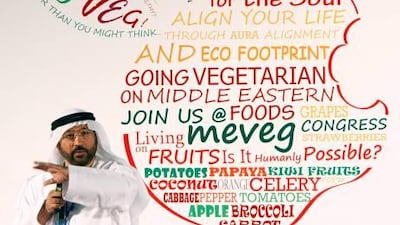DUBAI // Fruit and vegetables irrigated with desalinated water or through hydroponic growing systems lack dozens of essential minerals needed to keep people healthy, a salinity expert says.
To avoid mineral deficiencies, Dr Ahmed al Masoum, the deputy director general of the International Centre for Biosaline Agriculture (ICBA) in Dubai, said sea salt should replace table salt in people's kitchens, and farms should use small amounts of seawater in growing.
"The greatest source of [vitamins and minerals] is the food we eat," Dr al Masoum said. "However, mineral depletion and deficiencies exist, everyone is lacking one or two elements, and we usually make them up with food supplements."
To correct the imbalance, Dr al Masoum recommended sea water as the most comprehensive and "best source" for 90 essential elements.
These elements include nitrogen, phosphorus, potassium, calcium, magnesium, sulphur, boron, chlorine, iron, manganese, zinc, copper, and nickel. They are absorbed through plant roots from water.
Table salt possesses an average of only four essential minerals, and fewer than 20 elements are absorbed from fertilisers used in above ground, hydroponic growing.
Dr al Masoum was presenting a talk entitled "The effects of saltwater on high value fruits and vegetables" as part of the inaugural MeVeg Congress at the Dubai International Convention and Exhibition Centre.
The congress has brought together expert speakers to discuss vegetarianism and environmentally sustainable lifestyles, and runs alongside the eighth annual Middle East Natural and Organic Products Exhibition (Menope) which has attracted more than 100 exhibitors from 25 countries. MeVeg congress ends today and Menope tomorrow.
As populations become more dependent on processed water such as desalinated water, deficiencies can quickly become medical concerns, Dr al Masoum said.
The lack of fluoride in drinking water discoloured the teeth of many people from the past generation, he said, adding: "But now, in Sharjah, you find bottles of water that say 'plus fluoride'."
Seawater, even in small amounts, is not used in agriculture in the UAE, according to Dr al Masoum.
The ICBA has identified 224 plant species that could tolerate brackish water, which is less salty than seawater, but most are for animal fodder.
Salicornia, a small green plant that grows in saltwater, has drawn attention as a tasty addition to a salad and a possible source of biofuel. Last October, Masdar announced a pilot project to create fuel from the oil of salicornia.
Salicornia, variously known as sea asparagus, pickleweed and glasswort, is hardy, grows well in extreme heat and requires only saltwater.
"The United States uses salicornia as a green; instead of adding salt to a salad, just add salicornia and toss," Dr al Masoum said, adding that the UAE had grown the plant for many years.
Salt-tolerant plants are becoming increasingly important as the salt content in the ocean and groundwater rises.
The types of minerals, and amount of salinity, in underground water depends on the rock that surrounds the aquifer, said Dr al Masoum.
The desalination process that produces most of the UAE's water dumps brine back into the sea. The Gulf, due to its shallowness and high level of evaporation, is already one of the saltiest seas.

